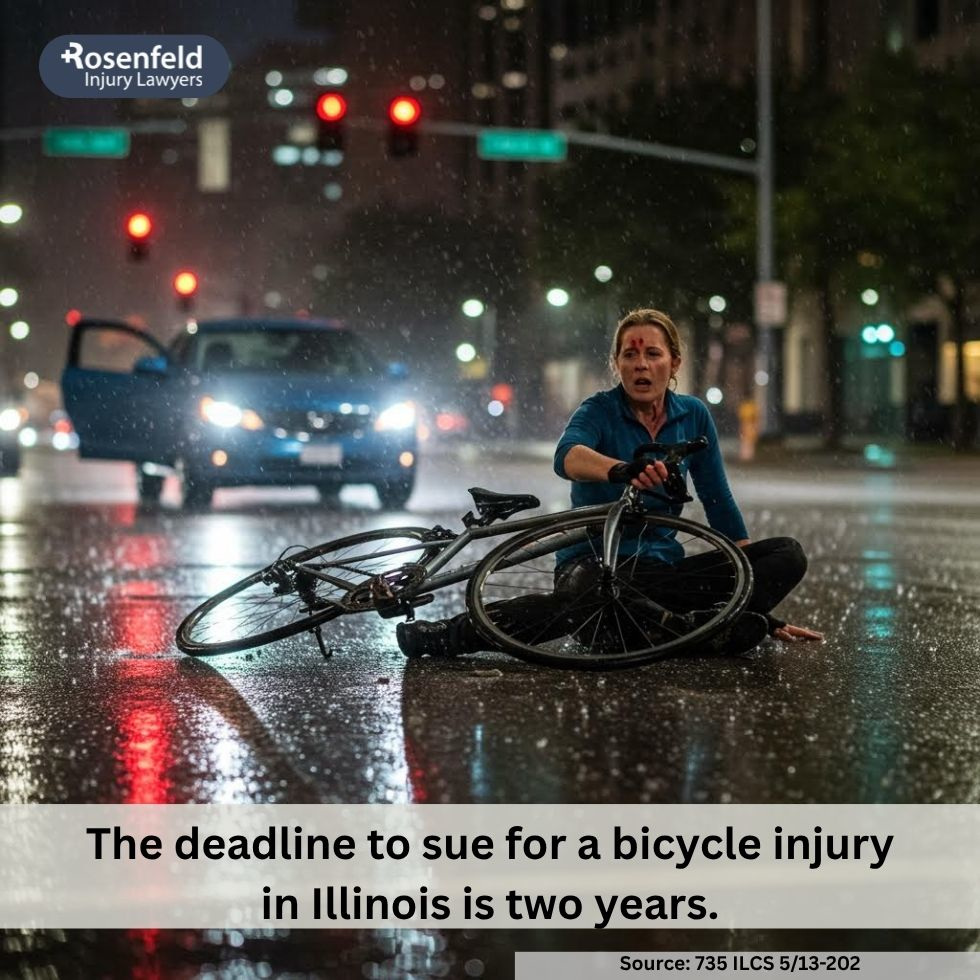- 24/7 Free Consultation: (888) 424-5757 Tap Here To Call Us
How Long Do I Have to Sue for a Bicycle Accident in Illinois?

A bicycle accident can lead to serious injuries, medical bills, and lost wages. You may have the right to pursue compensation if someone else is responsible for your injury. If you’re wondering how long do I have to sue for a bicycle accident in Illinois, it’s important to know that Illinois law limits the time you have to file a claim. Understanding the deadlines can help protect your right to recover damages.
The Statute of Limitations for Personal Injury Claims in Illinois
Filing a personal injury lawsuit after a bicycle accident requires meeting strict legal deadlines. Illinois law sets a time limit for pursuing injury claims, known as the statute of limitations. Understanding how this deadline applies to your bike accident case is essential.
The General Two-Year Rule Under Illinois Law
Under 735 ILCS 5/13-202, Illinois law gives injured individuals two years from the date of the accident to file a personal injury lawsuit. This applies to most bicycle accident cases, car accidents, slip-and-falls, and other personal injury claims.
This two-year limit applies to Illinois personal injury cases filed against private individuals or businesses. If the deadline passes, the Illinois court will likely dismiss your case, preventing you from pursuing compensation for bicycle accident injuries.

What Does “Date of the Accident” Mean?
In most cases, the statute of limitations begins on the accident date—the day the bike crash happened. For example, if you were injured in a bicycle accident on July 1, 2023, you would have until July 1, 2025, to file a personal injury lawsuit. Waiting beyond this deadline can result in losing your right to seek compensation.
The Discovery Rule: Exceptions for Delayed Discovery of Injuries
Some injuries are not immediately obvious. The discovery rule extends the statute of limitations when an injury is discovered later, or its connection to the accident isn’t immediately clear. Instead of starting the countdown on the accident date, the limitations period begins on the discovery date—when the injury is identified or should have been reasonably discovered.
For example:
- A cyclist suffers a traumatic brain injury (TBI) but has no immediate symptoms. If a doctor diagnoses the condition months later, the statute of limitations may begin on that discovery date.
- A rider experiences internal bleeding or organ damage that worsens over time. The discovery rule could apply if the injury wasn’t detected right away.
Exceptions to the Two-Year Statute of Limitations
While Illinois law generally allows two years to file a personal injury lawsuit after a bicycle accident, some situations can extend or shorten this deadline. Certain exceptions apply based on the injured person’s circumstances or the party being sued. Understanding these exceptions is essential to ensuring your claim is filed on time.
Claims Involving Minors
If a minor is injured in a bike accident, the statute of limitations does not begin immediately. Instead, the two-year period starts when the minor turns 18. This means an injured child has until their 20th birthday to file a personal injury lawsuit.
For example, if a 15-year-old cyclist is hit by a car, they would typically have until they turn 20 to file a claim. However, if a parent or guardian files on the child’s behalf before they turn 18, the case proceeds under the standard two-year deadline.
Claims Against Government Entities
A government entity like a city or county has stricter deadlines and additional procedural requirements. Under the Local Governmental and Governmental Employees Tort Immunity Act (745 ILCS 10/8-101), personal injury claims against local government agencies must be filed within one year of the accident date.
Additionally, many government entities require formal notice of a claim within as little as six months of the injury. This is common in cases involving unsafe road conditions, negligent public transit drivers, or government-owned vehicles.
Claims Involving a Death
If a bicycle accident results in death, the legal timeline changes. Under the Illinois Wrongful Death Act (740 ILCS 180/2), the deceased’s family or estate has two years from the date of death—not the accident date—to file a wrongful death lawsuit.
For instance, if a cyclist is severely injured in a crash but passes away months later due to those injuries, the statute of limitations starts on the date of death, giving the family two years from that day to file a claim. Wrongful death cases can also involve damages for funeral costs, loss of companionship, and financial support the deceased would have provided.
Claims Involving a Person Under Legal Disability
If an injured cyclist is legally disabled at the time of the accident, Illinois law may extend the filing deadline. A person with a legal disability, such as someone with severe cognitive impairment or a mental health condition that prevents them from managing their legal affairs, may have additional time to file.
In these cases, the statute of limitations may not begin until the disability is lifted. However, proving legal disability requires medical documentation, and waiting too long to act can still impact a case.
What Happens if You Miss the Statute of Limitations Deadline?
Missing the statute of limitations deadline can have serious consequences. If you file a personal injury lawsuit after the deadline expires, the Illinois court will likely dismiss your case, preventing you from recovering damages for medical bills, lost wages, property damage, and other losses.
Insurance companies are also unlikely to negotiate a settlement once the filing window has closed. Even if you have a strong case, failing to act in time means losing your right to pursue compensation.

Why It’s Crucial to Consult with an Attorney Promptly After a Bicycle Accident
Consulting with an experienced personal injury attorney as soon as possible can help protect your right to pursue compensation. A lawyer can ensure your case is filed within the correct deadline, gather essential evidence, and handle negotiations with insurance companies.
Accurately Determining the Applicable Statute of Limitations
While Illinois law generally allows two years to file a personal injury lawsuit, exceptions can apply. An attorney can review your case to determine the exact filing deadline, especially if factors like the discovery rule, minor status, or government liability affect your timeline. Missing the correct deadline could mean losing your right to recover damages.
Preserving Evidence and Building a Strong Case
The sooner you consult an attorney, the better your chances of preserving key evidence. Over time, accident scenes change, witnesses become harder to locate, and essential records may be lost.
A lawyer can:
- Collect police reports, medical records, and witness statements;
- Obtain surveillance footage or accident reconstruction reports;
- Document injuries and financial losses, such as medical bills and lost wages.
Negotiating with Insurance Companies
Insurance companies often try to minimize payouts in bicycle accident cases. They may dispute liability, downplay injuries, or pressure victims into accepting low settlements.
A Chicago bicycle accident injury lawyer from our team can handle all communication with insurers, ensuring you don’t accept less than you deserve. If a fair settlement isn’t offered, your attorney can file a personal injury lawsuit before the statute of limitations expires.
Get Started with the Legal Process!

If you or a loved one has been injured in a bicycle accident, the legal team at Rosenfield Injury Lawyers is here to help. Our Chicago-based personal injury attorneys have an in-depth understanding of Illinois law and will fight to recover the compensation you deserve.We work on a contingency fee basis, meaning you pay nothing unless we win your case. Call us at (888) 4245757 or fill out our contact form to schedule your free consultation.
All content undergoes thorough legal review by experienced attorneys, including Jonathan Rosenfeld. With 25 years of experience in personal injury law and over 100 years of combined legal expertise within our team, we ensure that every article is legally accurate, compliant, and reflects current legal standards.







